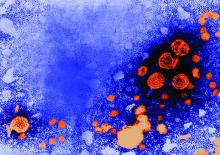results of an Italian study show.
The phase 3 open-label, controlled study included 732 healthy Italian children aged 11-13 years who as infants had received a two-dose primary and booster course with either Hexavac (5 mcg hepatitis B surface antigen [HBsAg]) or Infanrix hexa (10 mcg HBsAg) at 3, 5, and 11 months of age; the last dose was received at least 10 years prior to the challenge dose of a monovalent HB vaccine (HBVaxPro, 5 mcg HBsAg).
One month after the challenge dose, 84% (95% confidence interval, 80-87) and 96% (95% CI, 94-98) of children in the Hexavac and Infanrix hexa groups, respectively, had protective concentrations of HB surface antigen antibody of at least 10 mIU/mL, reported Dr. Alessandro Zanetti of Università degli Studi di Milano (Italy) and associates (Vaccine. 2017 Jul 13;35[32]:4034-40).Although some of the children had HB surface antigen antibody concentrations below the seroprotection threshold, most of them had an anamnestic response when challenged with the dose of HB vaccine, “indicating the presence of specific immune memory,” the investigators said. There was no evidence of active HB disease in any of the children.
Just what the meaning of the lack of immune memory is, defined as the failure to develop an anamnestic response following an HB vaccine challenge, remains to be determined.


